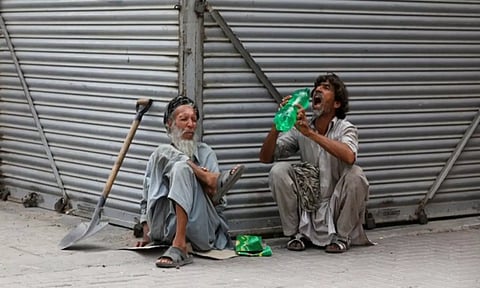

ISLAMABAD: The World Bank has reported an increase in poverty in Pakistan during the previous fiscal year due to soaring food and energy prices, labour market challenges, and flood-related damages, Dawn reported.
According to the Macro Poverty Outlook, which was prepared for the recent annual meetings of the World Bank and IMF in Marrakesh, Morocco, prolonged and high inflation in food and energy prices, combined with a lack of substantial economic growth, could lead to social upheaval and negatively impact the well-being of disadvantaged households that have already seen their savings dwindle and incomes decline.
The report indicates that poverty has risen due to declining wages, reduced job quality, and the impact of high inflation on the purchasing power of people living in poverty, according to Dawn.
Inflation is expected to remain elevated at 26.5 per cent in fiscal year 2024 before moderating to 17 per cent in fiscal year 2025 due to high-base effects and a decrease in global commodity prices.
However, the report notes that increased petroleum levies and energy tariff adjustments will sustain domestic energy price pressures, further contributing to economic and social insecurity.
Despite a short-term USD 3 billion loan agreement with the IMF earlier this year, foreign exchange reserves are projected to remain at a level insufficient to cover one month of total imports during the next fiscal year, necessitating ongoing import controls and constraining economic recovery, as reported by Dawn.
Real GDP growth is anticipated to reach only 1.7 per cent in fiscal year 2024, impacted by stringent fiscal and monetary policies, persistent inflation, and low confidence due to political uncertainties surrounding upcoming elections.
As economic growth resumes, poverty is expected to decrease to 37.2 per cent in fiscal year 2024. The report also forecasts a gradual widening of the current account deficit to 1.5 per cent of GDP in fiscal year 2025.
The overall economic contraction, high inflation, and flood-related damages have disproportionately affected poorer households, leading to increased inequality, with the Gini index rising by 1.5 points to 30.7 in fiscal year 2023.
Furthermore, last year's floods, which caused significant damage to public infrastructure, including schools and clinics, and prompted maladaptive economic coping strategies, such as children being withdrawn from schools, have likely exacerbated disparities in human development outcomes within and across regions, Dawn reported.